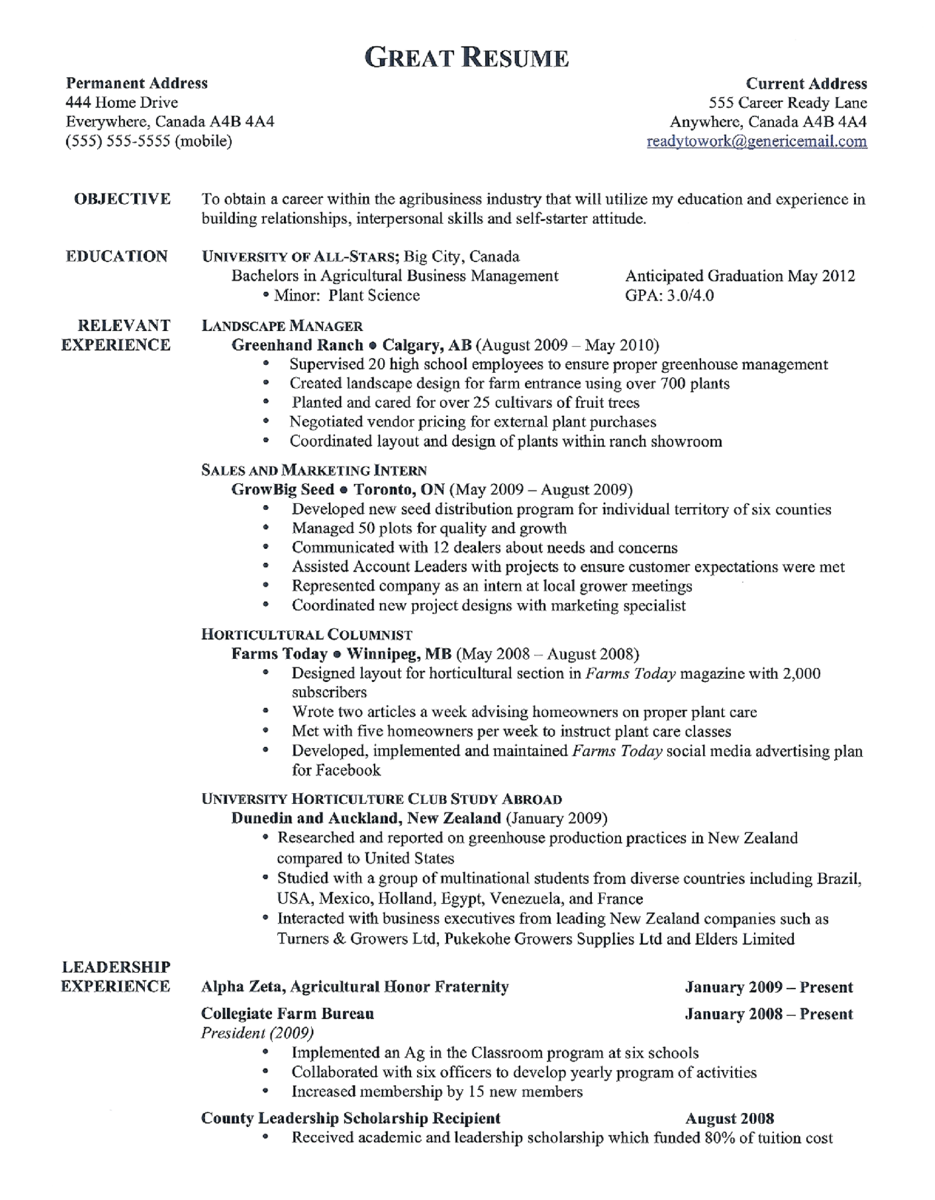 June 07, 2013
June 07, 2013 Career Guide Article
Career Guide Article
Properly crafting a resume, from its content to its appearance are essential steps to getting a potential employer to read it and consider it among the masses. This article is full of resume building tips as well as showing you the difference between a good and great resume.
Resumes: From Good To Great
by Ashley Collins, AgCareers.com Education Coordinator
When it comes to developing a resume, the number one thing to remember is the importance of spell check! The second most important thing to remember is that “it is all in the eye of the beholder,” especially when it comes to formatting. Some may want information in a very specific layout while others would like to see your creativity. However, there are some basic fundamentals that should not be ignored.
On average, employers spend less than 20 seconds scanning your resume. If you’ve been asked to e-mail or upload your resume to an online system versus a personal meeting at a career fair, your resume is the first impression you make on the recruiter.
You want to make sure you quickly highlight your best qualities to ensure that your resume lands in the “follow-up” stack of resumes. Below you’ll find some quick tips for developing a great resume. On the following two pages, you’ll find examples of a Good resume and a Great resume, highlighting some of the tips below and ideas for how you can take your resume to the next level.
RESUME TIPS:
- As a university student, your resume should be one page in length but if you’ve been very active and have lots of relevant experiences, it’s acceptable to be one and half to two pages in length.
- As a university student, the majority of the information on your resume should focus on experiences you’ve had while in college — leave high school in the past. Exceptions can be made for major accomplishments such as participation in your local 4-H chapter, Scout group or prior relevant work experience with a company.
- While in school, you should list both a permanent and current address in case you’re applying for a position close to home. This comes into play when applying for internships where housing may not be provided.
- If listing a mobile phone number, tell the recruiter that it is your mobile line and be conscious of your ringtone and voice mail greeting.
- If you use a generic e-mail address like Gmail or Hotmail, list that e-mail to ensure incoming messages from employers aren’t sent to your SPAM or JUNK folder on a school account. If using your school assigned e-mail address, be sure to check those folders routinely for communication from recruiters. Your email system my not identify them as ‘safe senders’ Be sure your e-mail address is professional — this is another opportunity you have to make a good first impression.
- List your major and graduation date, and if you have a GPA 3.0 or better, include that as well.
- If developing a resume for a career fair, you want to have a generic objective statement. If developing a resume to give to a specific employer, tailor your objective statement to match the company and job title. Remember to edit this before sending your resume to a different employer.
- List any professional certifications or association memberships/ participation you’ve had.
- Work experiences should be listed in chronological order (most recent followed by experiences that occurred prior).
- Use bullet points to provide easy-to-read examples of your work and be sure to provide quantifiable data for your accomplishments whenever possible.
- Start your bullet points with action verbs to describe what you did and be sure to watch the tense you use throughout the resume for consistency.
- Be careful about using industry verbiage. You want to demonstrate that you are well-versed in the lingo without using too many acronyms or abbreviations.
- The number of students who participate in study abroad experiences is rapidly growing. Set yourself apart by telling the employer usable detailed information about what you did on your trip and what you learned that can be applied in the business world.
- If you’ve earned scholarships that have significantly aided in deferring the cost of your education, list them under leadership experience or an additional information heading.
- If you’ve held any leadership roles within organizations, provide information about those duties and accomplishments.
- Use an easy-to-read font style and size and review it multiple times for spelling and grammar edits.
Once you’ve got your extraordinary resume ready, save it on your computer as firstname_lastname_ resume.doc versus myresume.doc. This will make it much easier for employers to save your resume in their files and find it easily. Be prepared to e-mail your resume, or upload it to company databases or job boards. Be sure to keep a list of where you’ve uploaded your resume and update these resumes frequently. Take extra copies with you to any interviews you may have, especially if you’ve updated the document, which you should do regularly!
Now that you’ve got the basics down, take a look at the following two examples and take your resume from good to great.



